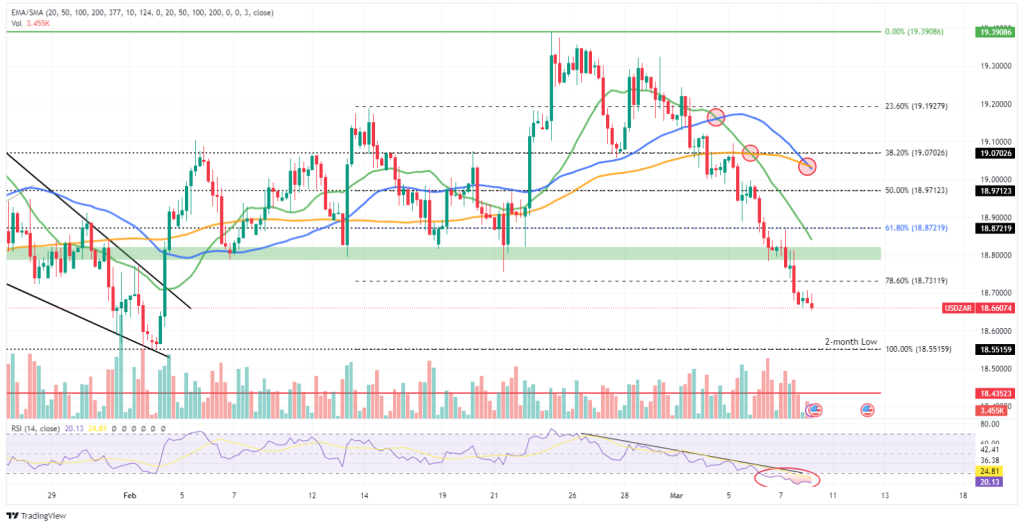
The South African Rand (ZAR) has strengthened against the US Dollar (USD) this week, capitalizing on a weaker dollar and rising gold prices. The Federal Reserve’s dovish stance, hinting at potential rate cuts later in 2024, has weighed heavily on the USD. Chair Jerome Powell’s recent comments suggest the central bank is nearing a point where inflation is approaching their target, potentially paving the way for an easing cycle. This has dampened demand for the dollar as a safe-haven asset.
Meanwhile, South Africa’s economic data presents a mixed picture. While the Q4 2023 GDP figures showed marginal growth, inflation continues to be a concern, rising to 5.3% in January – nearing the upper end of the South African Reserve Bank’s target range. Governor Lesetja Kganyago has emphasized that interest rate cuts will be contingent on controlling inflation. This could limit the ZAR’s upside potential in the near term.
Technical
The USDZAR price action is currently at R18.66074, on track for its seventh consecutive losing session ahead of the crucial Non-Farm Payroll (NFP) report. The price trades comfortably below all three key Simple Moving Averages (SMAs) – the 20-SMA (green line), 50-SMA (blue line), and 100-SMA (orange line). Notably, the 20-SMA and 50-SMA have recently broken below the 100-SMA in a bearish technical crossover.
This technical setup suggests strong downward momentum. Short-term trading opportunities could emerge if the price sustains its bearish move towards the initial support level at R18.55159, which represents a 2-month low. A decisive break below this level, especially accompanied by significant trading volume, could expose the pair to further declines towards R18.43523 in the short term.
However, the oversold territory on the Relative Strength Index (RSI) (currently at 20.13) indicates a potential correction. If the price fails to maintain its downward trajectory and breaks convincingly above the 78.60% Fibonacci retracement level (R18.87219), a retracement towards the 61.80% Fibonacci retracement level (R18.87219) could be in play. A confirmed surge above this initial resistance could open doors for further bullish momentum towards the 50.00% Fibonacci retracement level (R18.97123) and potentially even R19.07026.

Summary
The USDZAR technical outlook remains vulnerable ahead of the NFP data release. Short-term trading opportunities favour the downside, with an initial target of R18.55159 and a potential extension to R18.43523 if significant volume confirms the bearish momentum. However, a contrarian play is also possible, with a potential retracement towards the 61.80% Fibonacci retracement level (R18.87219) on a bullish breakout above the 78.60% level. Market sentiment surrounding the NFP data could significantly impact the pair’s direction. A strong NFP print might reignite USD buying, while a weaker report could exacerbate the USD’s decline and bolster the ZAR.
Sources: TradingView, Trading Economics, MSN, Reuters.
Piece written by Mfanafuthi Mhlongo, Trive Financial Market Analyst
Disclaimer: Trive South Africa (Pty) Ltd (hereinafter referred to as “Trive SA”), with registration number 2005/011130/07, is an authorised Financial Services Provider in terms of the Financial Advisory and Intermediary Services Act, 37 of 2002. Trive SA is authorised and regulated by the South African Financial Sector Conduct Authority (FSCA) and holds FSP number 27231. Trive Financial Services Ltd (hereinafter referred to as “Trive MU”) holds an Investment Dealer (Full-Service Dealer, excluding Underwriting) Licence with licence number GB21026295 pursuant to section 29 of the Securities Act 2005, Rule 4 of the Securities Rules 2007, and the Financial Services Rules 2008. Trive MU is authorized and regulated by the Mauritius Financial Services Commission (FSC) and holds Global Business Licence number GB21026295 under Section 72(6) of the Financial Services Act. Trive SA and Trive MU are collectively known and referred to as “Trive Africa”.
Market and economic conditions are subject to sudden change which may have a material impact on the outcome of financial instruments and may not be suitable for all investors. Trive Africa and its employees assume no liability for any loss or damage (direct, indirect, consequential, or inconsequential) that may be suffered. Please consider the risks involved before you trade or invest. All trades on the Trive Africa platform are subject to the legal terms and conditions to which you agree to be bound. Brand Logos are owned by the respective companies and not by Trive Africa. The use of a company’s brand logo does not represent an endorsement of Trive Africa by the company, nor an endorsement of the company by Trive Africa, nor does it necessarily imply any contractual relationship. Images are for illustrative purposes only and past performance is not necessarily an indication of future performance. No services are offered to stateless persons, persons under the age of 18 years, persons and/or residents of sanctioned countries or any other jurisdiction where the distribution of leveraged instruments is prohibited, and citizens of any state or country where it may be against the law of that country to trade with a South African and/or Mauritius based company and/or where the services are not made available by Trive Africa to hold an account with us. In any case, above all, it is your responsibility to avoid contravening any legislation in the country from where you are at the time.
CFDs and other margin products are complex instruments and come with a high risk of losing money rapidly due to leverage. You should consider whether you understand how these products work and whether you can afford to take the high risk of losing your money. Professional clients can lose more than they deposit. See our full Risk Disclosure and Terms of Business for further details. Some or all of the services and products are not offered to citizens or residents of certain jurisdictions where international sanctions or local regulatory requirements restrict or prohibit them.




